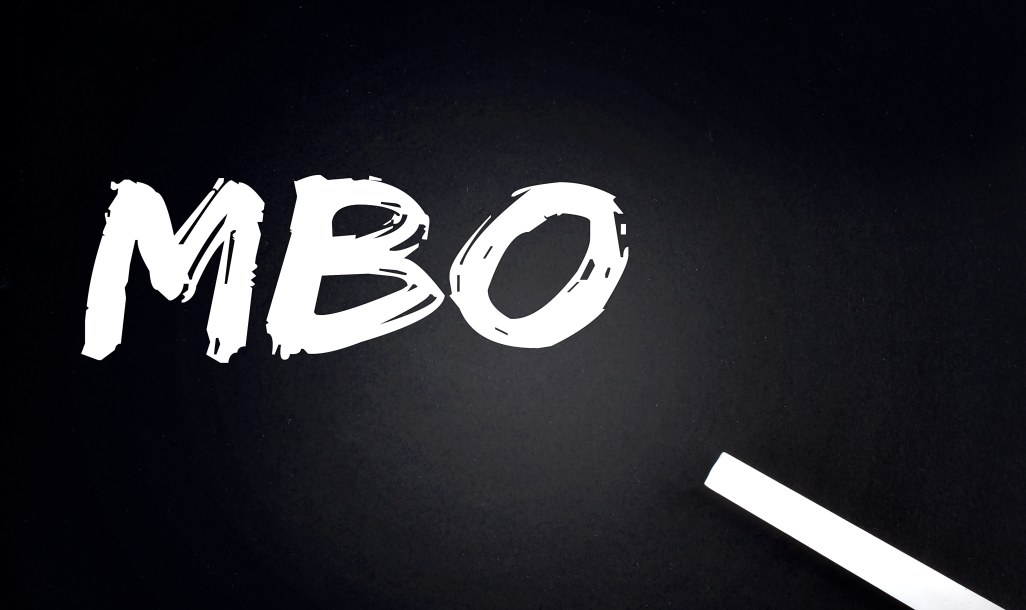Have you ever wondered what sets OKRs apart from MBOs? Do they both have the same goals in mind? Are there specific benefits to using one or the other? In this blog post, we’ll explore the similarities and differences between OKRs and MBOs, and discuss when it might be best to use each. We will also explain both MBO and OKR with examples to better understand how they can be used in your business.
So, let’s get started!
What is OKR
OKRs stands for Objectives and Key Results and usually refer to the business strategy tool/framework used to measure and track advancement towards specific objectives. In other words, it’s a way of setting company goals and then measuring whether or not you’ve achieved them.
The key part of OKRs is that they are measurable – so you can track your progress over time and see if you’re on track to achieve your objectives. There are different ways to set up OKRs.
Still, typically they involve setting a few broad objectives (e.g., increase sales by X%) and then several key results that need to be achieved to reach that objective (e.g., increase website traffic by Y%, convert Z% of visitors into customers, etc.).
What is MBO
MBO is a business management strategy that provides a framework for setting measurable goals and tracking progress. The key elements of MBO are objectives, action plans, and periodic reviews.
Objectives are specific, measurable plans aligned with the company’s strategy. Action plans are the steps that will be taken to achieve specific and clear objectives. Periodic reviews are used to track progress and identify any adjustments that need to be made to the action plan.
When used effectively, MBO can help businesses to improve their performance by providing a clear sense of direction and purpose. It can also increase transparency and accountability by ensuring everyone is working towards the same goals.
MBO Vs. OKR: What Is the Difference?
There are a lot of acronyms in the business world, and it can be tough to keep track of them all. Two of the most common are MBO and OKR. Though they both relate to setting goals, they are quite different.
- MBO, or management by objectives, is a process whereby managers and employees work together to set specific MBO goals that need to be achieved within a certain timeframe.
- OKR, or objectives and key results, is a system wherein employees set their own goals and are held accountable for meeting them.
The key difference between MBO and OKR framework is that, with MBO, managers play a more active role in goal setting, while with OKR, employees have more autonomy. Both systems have their strengths and weaknesses, so choosing the right one is important for your organization.
Critical Differences Between OKRs and MBOs
We’ve already touched on some of the key differences between OKRs and MBOs, but let’s take a closer look at some of the most critical differences.
Frequency of Reviews
As any business owner knows, setting goals is essential to success. But how often should those goals be reviewed? For companies that use MBO-style objectives, annual performance reviews are the norm. Objectives are set at the beginning of the year and then evaluated at the end. This approach works well for broad, strategic goals.
However, it can also lead to stagnation if objectives are not met. That’s why more and more companies are adopting OKRs (Objectives and Key Results). With this approach, goals are set quarterly and evaluated accordingly. This allows companies to change course and make decisions based on current information rather than waiting a year to address it.
Measurement and Scoring
Every company wants to know how they’re performing, and there are various ways to measure and score this data. Two popular methods are MBOs and OKRs. MBOs take qualitative and quantitative data into account, giving companies a more well-rounded view of their personal performance. Additionally, MBO scores are flexible and can be customized to a company’s specific needs.
On the other hand, OKRs are entirely quantitative, allowing companies to get a clear numerical picture of their results.
Transparent Not Siloed
Providing MBO feedback is usually done in person between the manager and the employee. This can be beneficial because it allows for honest and open communication between the two parties. However, it can also create a feeling of isolation among team members, as they are not privileged to the same information.
Additionally, organizational goals are not typically shared with the team, making it difficult for employees to understand how their individual goals fit into the larger picture.
By contrast, OKR goals align with the team’s objectives. This means that all team members are aware of what others are trying to achieve, creating a sense of fellowship and collaboration.
Compensation
In any organization, employees must be compensated fairly for their work. MBOs compensation focus on the individual performance of the employee. This means that employees are rewarded based on how well they meet annual performance goals.
On the other hand, OKRs focus on excellence rather than personal gain. This method rewards employees based on how many organizational goals have been achieved.
Do you need help implementing OKR or MBO to your business strategy?
Contact Growth Hackers
What Are the Examples of MBOs?
Following are three examples of MBOs that you may encounter in the workplace.
Human Resources
Human resource is a vital part of any business. Without HR, businesses would have difficulty managing employees and ensuring everyone is happy and productive. While the exact role of HR varies from business to business, there are some common responsibilities that all HR departments share.
One of the most important duties of HR is setting goals for the department and the business as a whole. For example, an HR department might maintain an employee satisfaction index of 80%. Once this goal is set, HR will create a plan to make it happen.
This might involve speaking with employees to get feedback on what they need to be happier at work or creating new programs or policies that will help boost employee satisfaction.
Marketing
Marketing is an important part of any business. It helps to set goals and objectives and then create a plan to achieve them. Marketing also helps evaluate performance and ensure that the goals are met.
To be successful, marketing must be able to listen to employees and get their input on what is realistic and what is not. Marketing must also be open to new ideas and feedback to achieve objectives. By working together, marketing and employees can achieve great things for the company.
Sales
Achieving goals is essential for any business, and the sales department is often charged with generating new leads and bookings. To do this, they must carefully consider the methods most effective for reaching potential customers.
In some cases, distributing fliers may be sufficient. However, in other cases, they may find that offering a freebie, such as a pen emblazoned with the company’s logo, can help to increase response rates.
By constantly evaluating their results and adjusting their methods accordingly, the sales department can ensure that they are always working towards their goals efficiently and effectively.
What Are the Examples of OKRs?
We will outline some examples of OKRs that are used at workplaces.
Marketing
Marketing teams are often responsible for long-term projects that require careful planning and execution. One way to help ensure these projects are successful is to encourage each team to develop its OKRs. By aligning at the project’s beginning, middle, and end, team members can better understand their roles and how their work fits into the overall goal.
Information Technology
As anyone in the information technology field knows, things are always changing. New software is released, updates are issued, and projects are constantly completed. As a result, it cannot be easy to keep track of everything that needs to be done.
The OKR methodology can help with this. By aligning IT objectives with the rest of the company, everyone can stay on the same page and work together more effectively.
Executive Team
Few things are more important to a company’s success than its executive leadership team. Tasked with setting the direction for the company at large, the executive team must inspire and challenge everyone in their ranks.
One of the best ways to do this is by setting clear yet ambitious goals. Goals that are too easy to achieve will quickly become boring, while goals that are impossible to reach will only serve to frustrate and demotivate employees.
The sweet spot lies in setting challenging yet achievable goals – known as OKRs. By setting and consistently hitting OKRs, the executive team can show everyone in the company that anything is possible with hard work and dedication.
Healthcare
The healthcare industry is highly complex. It is unpredictable and ever-changing, making it difficult to stay on top of things. That’s where OKRs come in. OKRs offer a way to bring order to an industry that can often feel chaotic. By setting precise objectives and measuring progress against those objectives, OKRs can help healthcare organizations stay focused and on track.
The Benefits of OKR and MBO
Regarding OKR vs. MBO, each should consider a few key benefits.
OKRs
- Focus: By setting specific, measurable goals, you can ensure everyone is working towards the same objectives. Furthermore, by setting deadlines for each goal, you can ensure that your team remains focused and on track.
- Alignment: Without clear objectives, employees can easily become siloed in their projects and lose sight of the big picture. But by setting measurable termini at the individual, team, and company levels, OKRs help ensure everyone is working towards the same goal. In addition, regular check-ins and feedback loops help to keep everyone on track and adjustable if need be.
- Tracking: When it comes to setting and achieving goals, the adage “what gets measured gets done” is especially true. By clearly defining what you want to achieve and how you will measure it, OKRs help you stay focused and on track. They also provide a way to track advancement and identify areas of improvement.
- Stretching: A key benefit of setting OKRs is that it can help organizations to stretch themselves and achieve more than they would have thought possible. When setting an OKR, it is important to choose a goal that is ambitious but also achievable. This ensures that employees are motivated to achieve the goal, but it also challenges them to push themselves and think outside the box.
MBOs
- Improved Communication: MBOs help to improve communication between management and employees. The key to MBO is setting clear objectives and then monitoring progress towards those objectives regularly. This provides opportunities for clarification and adjustment along the way. Communication is key to any successful business, and MBO helps establish processes to ensure it is happening.
- Better Performance: In the business world, there’s always a lot of talk about different management styles and what might work best for a particular company. MBOs’ most important benefit is that they can lead to better measuring performance. Employees with specific goals are more likely to put in the extra effort required to achieve them. And when they know that their manager is there to help them along the way, they’ll feel more motivated and supported.
- Efficient Utilization of Human Resources: Human resources are one of the most important assets of any organization. The efficient utilization of human resources can make the difference between a successful company and one that struggles to compete. One way to ensure the efficient utilization of human resources is through management by objectives (MBO). MBOs help to ensure that each employee is aware of the objectives of the organization and their role in achieving those objectives. Furthermore, MBOs help identifies areas where employees are not meeting their objectives.
- More Objective Performance Evaluation: MBOs also help to create a more objective performance evaluation. When employees know their performance will be measured against specific objectives, they’re more likely to focus on them and put in the required effort. And when managers clearly understand what is expected, they can better evaluate employee performance.
Boost your performance and deliver top-notch results with OKR and MBO!
What Is the Difference Between MBO and OKR?
In general, MBO is considered to be more directive, and OKR is considered to be more participative. MBO stands for management by objectives, while OKR stands for Objectives and Key Results. MBO is a more directive management style where the manager tells the employees what they need to do to achieve the company’s objectives. On the other hand, OKR is a more participative management style where employees help set the objectives and are responsible for measuring their own progress.
What Is MBO Vs. KPI?
- MBO is an acronym for “management by objectives.”
- KPI is an acronym for “key performance indicators.”
What Is the Difference Between OKRs and KPIs?
- OKRs (Objectives and Key Results) are a performance management framework that provides a simple yet powerful way to track improvement towards strategic objectives.
- KPIs (Key Performance Indicators) are the specific metrics used to track progress against an objective.
What Is the Alternative to MBO or OKR?
Smart goals are the most common alternative to OKR and/or MBO. Whether you pick OKR vs Smart Goals vs MBO vs KPIs, you should definitely work on it as early as possible. A strategy cannot be successful if you don’t define what you want to focus on and achieve.
Final Thoughts About OKR vs MBO
MBOs and OKRs are two popular performance management frameworks. MBOs focus on individual achievement, while OKRs focus on collective results. Both systems have advantages and disadvantages, so choosing the right one is important for your organization.
However, if you’re looking for a more participative management style, OKR may be the better option. It’s also important to remember that no performance management system is perfect, so it’s important to monitor and adjust as needed constantly.
The most important thing is to choose a system that works for your organization and helps you achieve your desired results.
Growth Hackers is surely one of the best HubSpot marketing agencies helping businesses from all over the world grow. There is no fluff with Growth Hackers. We help entrepreneurs and business owners implement OKR and MBO effectively, generate qualified leads, optimize their conversion rate, gather and analyze data analytics, acquire and retain users and increase sales. We go further than brand awareness and exposure. We make sure that the strategies we implement move the needle so your business grow, strive and succeed. If you too want your business to reach new heights, contact Growth Hackers today so we can discuss about your brand and create a custom growth plan for you. You’re just one click away to skyrocket your business.









